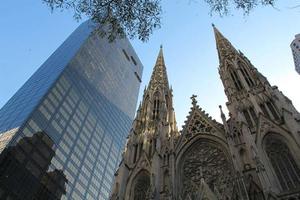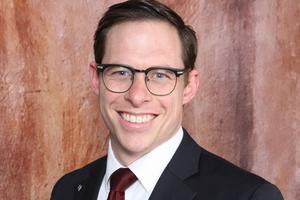Who Can Be Denied a Catholic Funeral? A History and Church Teaching on the ‘Very Rare’ Denials
‘Today, my concern is the number of Catholics that are not having a funeral Mass and going directly to burial. That’s not helpful to Catholics or to Catholic life.’

The confrontational behavior by mourners attending a funeral service at New York City’s St. Patrick’s Cathedral for a noted transgender activist on Feb. 15 prompted questions about why the service was allowed in the first place.
Officials with the Archdiocese of New York say they were misled, a claim the organizer of Cecilia Gentili’s funeral denies.
But while the details of that episode remain murky, one thing is clear: It’s much less common for someone to be denied a Catholic funeral than it used to be. Even some notorious organized crime lords have received a requiem Mass.
Many pastors are more worried about Catholics skipping funeral Masses than about someone requesting one unworthily.
“Presently, the more important value is that the person has available the sacrifice of Christ, which is the Mass, which brings his mercy to the deceased,” said Father Dennis Gill, rector of the Cathedral-Basilica of Sts. Peter and Paul in Philadelphia and the director of the Archdiocese of Philadelphia’s Office for Divine Worship.
“So it would be very rare — very rare — that a funeral Mass would be denied,” he said. “In fact, today, my concern is the number of Catholics that are not having a funeral Mass and going directly to burial. That’s not helpful to Catholics or to Catholic life.”
What Are the Grounds for Denial?
The default position in the Catholic Church is that Catholics get a funeral Mass if they or their family asks for one.
“Deceased members of the Christian faithful must be given ecclesiastical funerals according to the norm of law,” canon law (1176) states.
There are exceptions.
Current canon law (1184) denies a Church funeral to unrepentant “notorious apostates, heretics, and schismatics,” those who choose cremation “for reasons contrary to the Christian faith” (meaning they deny the resurrection), and “other manifest sinners” whose funeral would cause “public scandal of the faithful.”
That evidently doesn’t apply to many people. The Register asked every diocese in the United States if, in memory, the diocese had rejected a request for a funeral. Thirty-eight responded — a little more than one-fifth. Many said No. None provided examples of recent rejections.
As for standards, many told the Register they simply follow canon law. Some also provide further guidance for pastors.
“Someone who had rejected the faith, caused scandal, or was known to be anti-Church could be refused by the pastor. In some instances, other prayer forms might be utilized outside of a public funeral Mass,” said Carolee McGrath, media relations manager for the Diocese of Springfield, Massachusetts, by email.
The Diocese of Paterson, New Jersey, directs pastors to consult the bishop or his delegate if “there is an extraordinary case when the Funeral Mass would cause confusion or scandal because the departed lived with public, pronounced disdain for the faith, and refused any hint of reconciliation with the Church.”
“Careful discussion in these rare cases addresses the needs of the bereaved family and recognizes that the departed was not open to the Catholic faith or died without any sense of the need for reconciliation. The scriptures tell us that ‘It is a holy and wholesome thought to pray for the dead, that they may be loosed from sins’ (2 Maccabees 12:46),” the diocese’s guidance states.
“We should pray for all of the departed,” the guidance continues. “It is also important to encourage the faith of the Body of Christ, the Church, by evaluating difficult cases with care so that no one is hurt by what might be a celebration that does not serve the communion of the Church.”
Father Gerald Murray, a canon lawyer and a pastor in New York City, told the Register a priest who receives a request for a Catholic funeral should meet with the family or other person making the request and during the meeting determine if the deceased falls into a restricted category.
“In the case of someone who enjoys public prominence, an internet search may quickly reveal valuable information,” Father Murray said by email.
A delicate situation ought to be referred to the local bishop, he added.
“It is always wise to consult the bishop when the refusal of a funeral is likely to cause public comment and even resentment of what could be labelled as an un-Christian denial of a Church funeral,” Father Murray said.
More Barriers to Funerals in the Past
Denying a Catholic funeral was more common 50 years ago than it is today. Choosing cremation was a disqualifying factor, until 1963, when the Vatican issued a document allowing cremation. So were suicide and dying in a duel — and, in the United States, the most common situation, divorcing and civilly remarrying, an act that routinely led to denial of a Catholic funeral.
The 1983 Code of Canon Law eliminated suicide and dueling. Ten years before that, in 1973, the Vatican’s Congregation for the Doctrine of the Faith lifted the ban on funeral Masses for those in what the congregation called an “irregular matrimonial situation.”
Then and now, scandal — which the Catechism of the Catholic Church defines as “an attitude which leads another to do evil” (2284) — is grounds for denying a funeral. Some examples appear in old newspaper stories.
In 1974, about a year after Roe v. Wade legalized abortion nationwide, the Archdiocese of Chicago denied a funeral Mass to Suzanne Loutsch, a 26-year-old woman who died when her parachute didn’t open properly while skydiving, after finding out that she was the administrator of an abortion facility.
The Archdiocese of New York denied a funeral Mass to mafia bosses killed in mob hits, including Carmine “Lilo” Galante in 1979 and Paul Castellano in 1985, but in both cases allowed a priest to say prayers at the gravesite.
In 1986, the Diocese of Brooklyn denied a funeral Mass to mafia underboss Frank DeCicco, but allowed a priest to say prayers at the gravesite. In 2002, the Diocese of Brooklyn denied a funeral Mass for notorious mafia boss John Gotti, who died in 2002 of throat cancer in a federal prison, but allowed him to be buried in a Catholic cemetery.
In 1982, the Archdiocese of Philadelphia denied a funeral for Frank “Chickie” Narducci, a mobster shot to death in South Philadelphia, citing as a reason having no record of a marriage to his wife. He was allowed to be buried in a Catholic cemetery, however.
In other situations, though, Church officials have opted for a restriction rather than a ban.
Msgr. William King, assistant professor of canon law at The Catholic University of America in Washington, D.C., told the Register that when he was vicar general of the Diocese of Harrisburg, Pennsylvania, about 15 years ago the family of a persistent and vocal critic of Church teachings wanted a funeral Mass for him when he died. The diocese allowed it, but without a public announcement.
That’s also what happened in 2018 when mobster James “Whitey” Bulger died in federal prison at the hands of fellow inmates. Bulger, convicted of 11 murders and suspected of many more, was a longtime figure in organized crime in Boston and the subject of two major motion pictures, The Departed (2006) and Black Mass (2015). A funeral Mass for Bulger was celebrated in the parish church he grew up attending without an announcement beforehand — though local newspapers found out about it and published photos of attendants leaving the church.
Father Darrin Connall, the vicar general of the Diocese of Spokane, Washington, and rector of the diocese’s Cathedral of Our Lady of Lourdes, told the Register the diocese in recent years held a private unannounced funeral Mass for a retired priest suspended over credible accusations of sexual abuse.
“We wanted to be sensitive to the victims and the suffering that they had already gone through, and we didn’t want to exacerbate their suffering, while at the same time we wanted to pray for the guy’s soul,” Father Connall said.
Prayer for the Dead, Not a ‘Celebration of Life’
As young people drift away from the faith of their fathers, it’s not uncommon nowadays to see in an obituary a description of frequent church attendance and involvement in Catholic organizations, followed by no announcement of a funeral Mass.
Priests contend funeral Masses sometimes don’t take place because the children of the deceased can’t get the time of day that they want for the service or refuse to commit to burying the cremated remains of their parent, as the Church requires.
In many cases, though, it’s simply lack of interest.
“Adult children have said to me, ‘It means nothing to me, Father,’” Msgr. King said. “Well, true, but your mother or father was a daily communicant. It meant so much to them.”
Msgr. King told the Register that some of the language commonly used during funerals these days — such as calling a funeral a “celebration of life” — causes confusion about what its purpose is.
“It isn’t a celebration of life of the individual. It’s a celebration of the life, death and resurrection of Jesus, without which the life of individuals has no meaning,” he said.
The power of the Mass and the Church’s strong inclination to pray for the dead help explain why the Church is reluctant to deny a funeral Mass and why Church authorities are more lenient on this point than they used to be.
“I think the previous focus was on the objective circumstance, which could indicate sin, and now the focus is on the individual, and perhaps the recognition that the person could benefit from the grace of the Mass — not seeing it as a reward for virtuous living, but as a petition for mercy,” Msgr. King said. “We can’t see a funeral Mass as a reward for a virtuous life. Otherwise, we wouldn’t have many.”
- Keywords:
- catholic funerals
- new york archdiocese
- funerals















